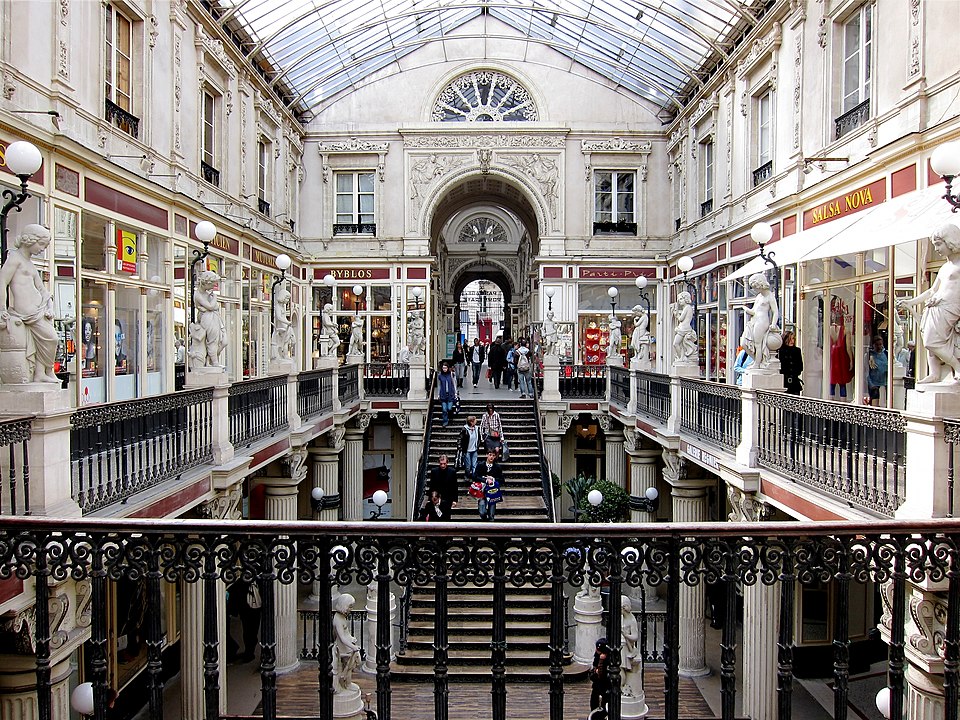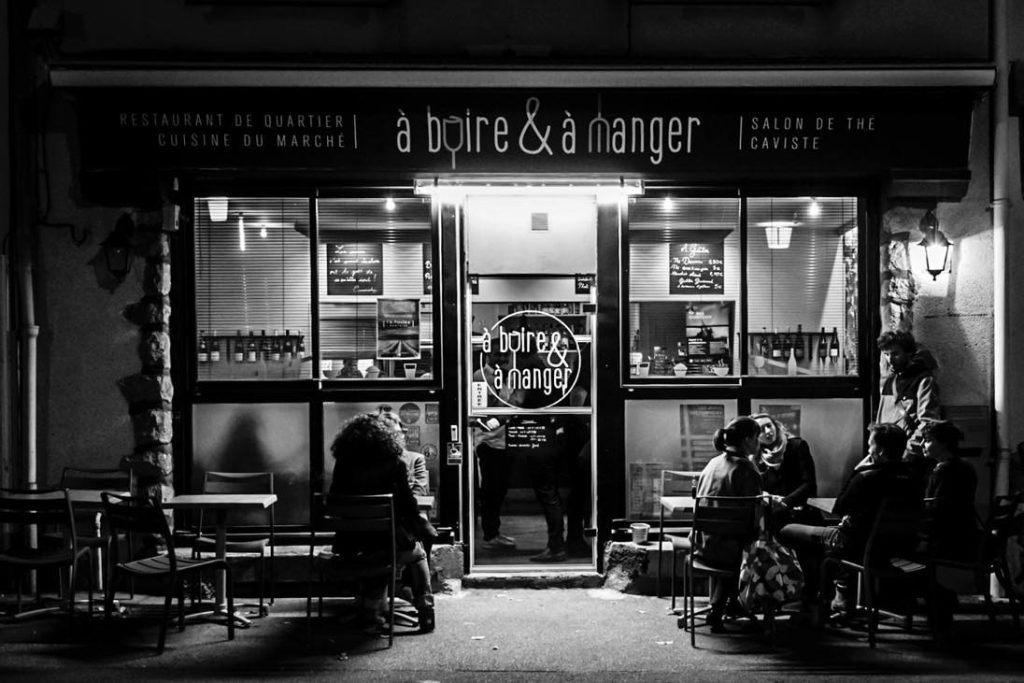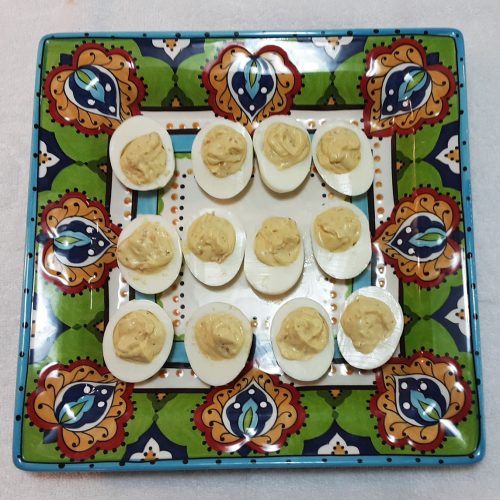Exploring culinary boundaries can often lead to discovering delectable delicacies. Such is the case with our French-Style Deviled Eggs, a deviation from the classic American version that is both intriguing and delicious. Originating from the cultural hub of Nantes in France, these deviled eggs are remarkable, and their distinguishing factor lies in the liberal use of red wine vinegar. This unique ingredient infuses the dish with a characteristic tartness, offering a tangy twist to the familiar flavors of deviled eggs.
In the early stages of perfecting this recipe, a teaspoon of red wine vinegar was added to the mix. The resultant burst of flavor, though impressive, may surprise those accustomed to the mildness of traditional deviled eggs. To cater to a wider range of palates, an alteration was made to the recipe. The vinegar quantity was halved for the subsequent batch, yielding a toned-down version with a subtle tanginess that complemented the creamy egg filling beautifully.
The beauty of this French-Style Deviled Eggs recipe lies in its versatility and room for customization. Though red wine vinegar takes center stage in this version, adjustments can be made according to individual preferences. It’s all about striking the perfect balance between retaining the essence of the original French recipe and catering to your personal taste.
Table of contents
Diversifying Your Palette: Innovative Twists to Deviled Eggs
The traditional deviled eggs recipe has been a beloved staple in many households, celebrated for its creamy, flavorful filling. However, it’s always exciting to experiment with this classic dish by adding a little flare to your preparation. Consider adorning your deviled eggs with eclectic toppings such as crispy bacon, ripe avocados, spicy jalapenos, crunchy fried onions, or even succulent lobster for an upscale twist.
In addition to diversifying the toppings, the egg whites themselves can undergo various treatments to create unique variations of this dish. From pickling to grilling to frying, these methods each lend a distinctive taste and texture to the egg whites, further enhancing the overall appeal of your deviled eggs. Such innovative recipes are bound to impress at any gathering, whether it be a picnic, party, or barbecue.
Remember, the joy of cooking lies in experimentation and innovation. There are endless ways to reinvent deviled eggs, turning this classic dish into a canvas for culinary creativity. So, don’t hesitate to try something new the next time you’re making deviled eggs. You never know, your unique creation might just become the next crowd favorite.
Effective Storage Techniques for Deviled Eggs
Eggs are a staple in many households, but effective storage methods are crucial to maintaining their freshness and safety. For store-bought eggs that have undergone washing, a refrigerated environment ensures a shelf life of approximately 45 days. For those opting for countertop storage, a thin vaseline coating on the eggshell can prevent bacteria infiltration, extending its freshness for up to 21 days.
Cooked eggs require different storage considerations. After preparation, these can be safely stored in the refrigerator for up to four days. While freezing cooked eggs is an option, it’s crucial to note that their taste is best preserved when consumed within three to six months of preparation.
Deviled eggs, with their creamy filling and delicate structure, also require specific storage measures to maintain their taste and appearance. To prevent them from turning soggy or losing their shape, avoid refrigerating uncooked deviled eggs. Cooked deviled eggs, however, can be safely refrigerated for up to four days. When it comes to freezing, place cooked eggs on a tray in the freezer until fully frozen. After freezing, transfer them to an airtight container to prevent freezer burn and keep them flavorful.
Tracing the Origins: The Intriguing History of Deviled Eggs
Our journey into the captivating history of deviled eggs takes us back to the grandeur of ancient Rome, where the first recorded preparation of this dish was found. Romans relished boiled eggs adorned with spicy sauces, often serving them as a first course during meals. This practice set the stage for the birth of the modern-day deviled egg.
The evolution of deviled eggs witnessed an important milestone in 13th-century Spain. Here, culinary innovations led to the mashing of yolks, a technique that allowed the preparation of a stuffing for the eggs. By the 15th century, this concept had spread across Europe, and the version of deviled eggs that we are familiar with today began to take shape.
The beauty of the deviled eggs lies not just in their rich, creamy taste but also in their deep historical roots that span across centuries and civilizations. Its evolution from a simple boiled egg in ancient Rome to the diverse variations we see today is a testament to the transformative power of culinary creativity. So, the next time you bite into a deviled egg, remember that you’re partaking in a tradition that has been enjoyed for centuries.
Nantes: The Vibrant Metropolitan City in Western France
Nestled on the banks of the Loire River, the metropolitan city of Nantes serves as a historical and industrial hub in the Upper Brittany region of western France. It’s a city steeped in history, with its medieval Château des Ducs de Bretagne standing as a testament to its past. Once home to the Dukes of Brittany, the castle has since been restored and converted into a history museum, boasting multimedia exhibits and offering visitors a walk atop its fortified ramparts.





Visitors to Nantes are treated to an array of experiences that span history, culture, and gastronomy. The city’s well-preserved architecture is a sight to behold, showcasing styles from different eras. While the medieval castle offers a glimpse into the city’s past, the modern urban landscape highlights Nantes’ growth and evolution.
Whether you’re a history buff, an art lover, or a foodie, Nantes has something to offer. Its rich heritage, coupled with its vibrant contemporary culture, makes this city a must-visit destination. Nantes is a city that expertly balances the preservation of its past with the dynamism of the present, making it a treasure trove of experiences waiting to be discovered.
Unearthing the Past: A Glimpse into the History of Nantes, France
The history of Nantes is as fascinating as the city itself. The region was initially settled during the Bronze Age, a period later than the surrounding regions, which already had Neolithic monuments. Its first inhabitants were likely lured by small deposits of iron and tin present in the subsoil. The area’s export of tin, mined in Abbaretz and Piriac, extended as far as Ireland.
Over a thousand years, a local industry emerged around 900 BC, with evidence of smithies dating back to the eighth and seventh centuries BC found in the city. Historians believe Nantes may have been the major Gaulish settlement of Corbilo, documented by Greek historians Strabo and Polybius, and situated on the Loire estuary.
The Roman Empire’s influence over Nantes was profound during the early Middle Ages. Although many parts of Brittany experienced significant Breton immigration, severing ties with Rome, Nantes continued its alliance with the empire until its fall in the fifth century. However, the French Revolution caused economic havoc for Nantes, significantly impacting the local economy and trade with European countries. Despite this setback, Nantes carries the echoes of its past into its present, forever marked by its historical journey.
Experiencing Nantes: Uncovering the City’s Cultural and Touristic Highlights
Nantes is a city teeming with cultural, artistic, and historic attractions. Among its notable sites is the newly refurbished natural history museum, a haven for those interested in the evolution of flora and fauna. For art enthusiasts, the Musée des Beaux-Arts is a must-visit. Housing works dating from the 13th to the 19th century, the museum also showcases an impressive contemporary art collection.
The cultural richness of Nantes extends beyond its museums and historical landmarks. The city has a thriving live music scene, catering to a variety of tastes, and even boasts its own opera house. Additionally, Nantes hosts a vibrant calendar of events, including a much-anticipated carnival in April.
Visiting Nantes offers an immersive experience, filled with culture, history, and entertainment. Whether you’re an art lover, a history enthusiast, or a music fan, Nantes provides a plethora of attractions that cater to all tastes. Step into the heart of this vibrant city, and let it sweep you off your feet with its captivating charm and energy.
Savoring Nantes: An Exploration of its Unique Cuisine
Nantes’ cuisine may not have a single signature dish like Lyon or Marseille, but it does offer an enticing array of culinary delights. As a seaport, Nantes has a strong tradition of preparing sumptuous fish dishes. Zander, salmon, and pike are among the local favorites, each crafted into delectable dishes by the city’s skilled chefs.
Nantes’ past as France’s largest slaving port also plays a significant role in shaping its cuisine. Over 2,000 slave ships embarked from Nantes, heading for the Guinean coast, Haiti, and the West Indies. The long sea journeys necessitated the creation of cakes and biscuits that could withstand the passage of time. One such creation is the gateau nantais, a mix of brown cane sugar, flour, eggs, and often heavily laced with rum from the Antilles.
The cuisine of Nantes, shaped by its maritime tradition and historical past, offers an eclectic mix of flavors to its residents and visitors. Whether you’re sampling the local seafood or trying out the long-lasting baked goods, the unique taste of Nantes is sure to delight your palate. This fusion of past and present in its cuisine is what makes Nantes’ food culture truly unique and intriguing.
– Featured Restaurant –
Restaurant Chantenay Nantes – A Boire et à Manger
16 Rue de la Marseillaise, 44100 Nantes, France
Something between a canteen and a neo-bistro, this is the type of spot we hope to find in every neighborhood. Karine Bourgeois has imagined a hangout for friends and neighbors, where her smiling welcome gives the place a feeling of joy and warmth. With a good time sure to be had, sit down to discover the chef’s healthy and tasty proposals, all made from fresh products, before toasting with one of the honorable Loire wines on the menu.
Mastering French-Style Deviled Eggs: A Step-by-Step Guide
The culinary journey into the realm of French-style deviled eggs is one filled with taste and excitement. This recipe hails from the scenic city of Nantes, France, and brings a twist to the conventional American-style deviled eggs. The standout flavor here is the red wine vinegar, which imparts a unique tanginess that perfectly complements the creamy filling. You may wish to adjust the vinegar quantity based on your preference. After experimenting with the recipe, we found halving the original quantity of vinegar resulted in a more balanced flavor profile.
The process of making these deviled eggs is straightforward and quite enjoyable. First, you’ll prepare the hard-boiled eggs, then carefully remove the yolks to create a filling. This filling combines the yolks with other flavorful ingredients, including the red wine vinegar, to create a creamy, tangy mixture. Once filled, the eggs are usually garnished with fresh herbs or spices for an added layer of flavor.
French-Style Deviled Eggs aren’t just a delicious appetizer, they’re also a conversation starter. Their unique flavor, different from the traditional American deviled eggs, introduces a new taste experience that’s sure to intrigue and satisfy. And since they are quick and easy to make, they’re perfect for serving at get-togethers, parties, or as a part of a larger spread.
Essentials for Crafting French-Style Deviled Eggs
Before embarking on the culinary adventure of creating French-Style Deviled Eggs, it’s crucial to ensure you have all the necessary equipment and ingredients at hand. The basic utensils include a pot for boiling the eggs, a bowl for mixing the filling, and a piping bag or spoon for filling the egg whites. The key ingredients include eggs, red wine vinegar, mayonnaise, and mustard, along with your choice of garnish. Having everything ready before you start makes the cooking process smoother and more enjoyable.

Equipment Needed
- 1 Large Sauce Pan
- 1 Knife
- 1 Mixing Bowl
Ingredients Needed
- 6 eggs
- ¼ cup mayonnaise
- 1 tsp red wine vinegar
- 1 tsp grainy Dijon mustard
- 1 tsp lemon juice
- 2 tbsp minced shallots or minced red onion
- salt and black pepper to taste
Time needed: 25 minutes
How to Make French-Style Deviled Eggs
- Boil the Eggs
Place the eggs in a pot with cold water about an inch over the eggs. Bring to a boil. Once water is boiling, cover and remove from heat. Let it sit for 12 Minutes. Then transfer the eggs to a colander and rinse with cold water to stop the cooking process.
- Peel the Eggs
Peel the eggs, and remember it can sometimes be hard and if they don’t peel perfectly that’s OK.
- Cut the Eggs
Using a sharp knife, cut the peeled eggs in half lengthwise. Use a spoon to carefully remove the yolks, and set them aside in a small bowl. Place the egg whites onto a platter, or another kind of serving dish.
- Mix the Filling
Add all ingredients, except the thyme garnish (if using) to the egg yolks. Using a fork, smash and stir all ingredients together until fully incorporated. Lemon juice is optional because it can make the filling a bit more runny than normal.
- Fill the Eggs
For a fancy clean look, use a clear plastic Ziploc bag to pipe the filling into the eggs. Place the filling in the corner of a bag, and cut the edge (about 1/2″) off the bag. Fill each egg. If you don’t want to use a bag, simply spoon in the filling.
- Refrigerate and Serve
Refrigerate until ready to serve.
French-Style Deviled Eggs
Please Rate this Recipe
Equipment
- 1 Knife
Ingredients
- 6 eggs
- ¼ cup mayonnaise
- ½ tsp red wine vinegar
- 1 tsp dijon mustard
- 1 tsp lemon juice
- 2 tbsp shallots minced
- salt to taste
- black pepper to taste
Instructions
- Place the eggs in a pot with cold water about an inch over the eggs. Bring to a boil. Once water is boiling, cover and remove from heat. Let sit for 12 Minutes. Then transfer the eggs to a colander and rinse with cold water to stop the cooking process.6 eggs
- Peel the eggs, and remember it can sometimes be hard and if they don’t peel perfectly that’s OK.
- Using a sharp knife, cut the peeled eggs in half lengthwise. Use a spoon to carefully remove the yolks, and set them aside in a small bowl. Place the egg whites onto a platter, or other kind of serving dish.
- Add all ingredients, except the thyme garnish (if using) to the egg yolks. Using a fork, smash and stir all ingredients together until fully incorporated. Lemon juice is optional, because it can make the filling a bit more runny than normal.¼ cup mayonnaise, ½ tsp red wine vinegar, 1 tsp dijon mustard, 1 tsp lemon juice, 2 tbsp shallots, salt, black pepper
- For a fancy clean look, use a clear plastic Ziploc bag to pipe the filling into the eggs. Place the filling in the corner of a bag, and cut the edge (about 1/2″) off the bag. Fill each egg. If you don’t want to use a bag, simply spoon in the filling.
- Refrigerate until ready to serve.
Nutrition
Complementing Dishes for French-Style Deviled Eggs
As delightful as our French-Style Deviled Eggs are, the dining experience can be further enhanced by pairing them with the perfect complementing dishes. Here, we’ve curated an exquisite selection of recipes that balance and accentuate the refined flavors of the deviled eggs. Whether you’re seeking a main course, a side dish, or a dessert, these selections promise to create a harmonious dining experience that highlights the best of French cuisine.
We hope these suggested pairings have inspired your next meal planning endeavor. Remember, the beauty of French cuisine lies in its diversity and rich flavors. Each dish presented here is meant to complement the French-Style Deviled Eggs, creating a comprehensive and delightful meal. Whether you follow these suggestions or choose to explore your culinary creativity, we’re confident that your experience with these deviled eggs will be nothing short of exquisite. Enjoy your culinary journey!
Photo Credits:
- By Taste The World Cookbook – Copyright 2022 All rights reserved.
- By Restaurant Chantenay Nantes – A Boire et à Manger – By https://www.facebook.com/aboireetamangernantes/
- By Eric Brosselin – Own work, CC BY-SA 3.0, https://commons.wikimedia.org/w/index.php?curid=29150890
- By Jean-Pierre Dalbéra from Paris, France – Cour intérieure du château des ducs de Bretagne (Nantes), Public Domain, https://commons.wikimedia.org/w/index.php?curid=24666561
- By Velvet – Own work, Public Domain, https://commons.wikimedia.org/w/index.php?curid=10346301
- By Jibi44 – Own work, CC BY-SA 3.0, https://commons.wikimedia.org/w/index.php?curid=4206312
- By © Guillaume Piolle, CC BY 3.0, https://commons.wikimedia.org/w/index.php?curid=5167485





